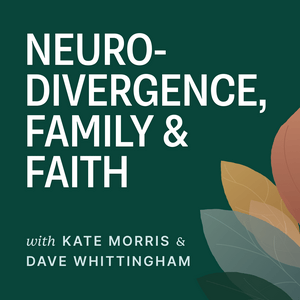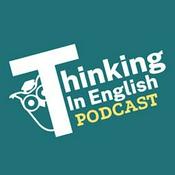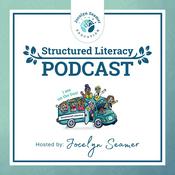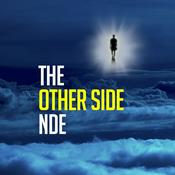Neurodivergence, Family and Faith
Kate Morris and David Whittingham

Latest episode
13 episodes
- How can marriages flourish when there is a mix of neurotypes in the couple? In this episode, Mairi Girgis, a couples counsellor with years of experience in this area, joins Kate and Dave to discuss some of the complexities of marriage and parenting within neurodivergent families. With her extensive background in counseling and research into neurodivergence in the Christian community, Mairi sheds light on the unique challenges couples face when their experiences and communication styles differ significantly.
To financially support this podcast, donate at our GoFundMe page here.
To read helpful articles from Kate, head to her Substack page, An Extraordinary Normal
Dave's Bible story podcasts are called Stories of a Faithful God and Stories of a Faithful God for Kids and can be found wherever you get your podcasts.
This podcast is a part of the Faithful God Network. Discover more great podcasts at faithfulgod.net - When our neurodivergent kids find comfort in everything staying the same, how do we help them navigate the inevitable big changes in life? In this episode, Kate and Dave discuss the challenges of facing major moments like moving house, changing school or church, or even leaving a country. They talk through practical tips for how to help kids through each stage of the change, as well as how to keep the God who never changes central to all we do. Join our growing community for this first episode of season 2.
To financially support this podcast, donate at our GoFundMe page here.
To read helpful articles from Kate, head to her Substack page, An Extraordinary Normal
Dave's Bible story podcasts are called Stories of a Faithful God and Stories of a Faithful God for Kids and can be found wherever you get your podcasts.
This podcast is a part of the Faithful God Network. Discover more great podcasts at faithfulgod.net
Citations
Deci, E. L., & Ryan, R. M. (2000). The “what” and “why” of goal pursuits: Human needs and the self-determination of behavior. Psychological Inquiry, 11(4), 227–
268.
Lerner, M. D., Gurba, A. N., & Gassner, D. L. (2023). A framework for neurodiversity-affirming interventions for autistic individuals. Journal of Consulting and Clinical Psychology, 91(9), 503–504.
Niemiec, C. P., & Ryan, R. M. (2009). Autonomy, competence, and relatedness in the classroom: Applying self-determination theory to educational practice. Theory and Research in Education, 7(2), 133–144.
Nuske, H. J., McGhee Hassrick, E., Bronstein, B., Hauptman, L., Aponte, C., Levato, L., Stahmer, A., D. S., Mundy, P., Kasari, C., & Smith, T. (2019). Broken bridges—New school transitions for students with autism spectrum disorder: A systematic review on difficulties and strategies for success. Autism: The International Journal of Research and Practice, 23(2), 306–325.
Prochaska, J. O., & DiClemente, C. C. (1986). Towards a comprehensive model of change. In W. R. Miller & N. Heather (Eds.), Treating addictive behaviours: Processes of change. Plenum Press.
Quill, K. A., & Stansberry Brusnahan, L. L. (2017). Do-watch-listen-say: Social and communication intervention for autism spectrum disorder (2nd ed.). Paul H. Brookes Publishing Co.
Ryan, R. M., & Deci, E. L. (2000). Self-determination theory and the facilitation of intrinsic motivation, social development, and well-being. American Psychologist, 55(1), 68–78.
Steinbrenner, J. R., Hume, K., Odom, S. L., Morin, K. L., Nowell, S. W., Tomaszewski, B., Szendrey, S., McIntyre, N. S., Yücesoy-Özkan, S., & Savage, M. N. (2020). Evidence-based practices for children, youth, and young adults with autism. FPG Child Development Institute.
Wehmeyer, M. L. (2020). The importance of self-determination to the quality of life of people with intellectual and developmental disabilities. Inclusion, 8(2), 89–98.
Webster, A., Bruck, S., & Saggers, B. (2022). Supporting self-determination of autistic students in transitions. Research in Developmental Disabilities, 128, Article 104301. https://doi.org/10.1016/j.ridd.2022.104301 - Christmas is a time to celebrate the birth of our saviour Jesus and the true joy that comes from knowing him. Yet the way we celebrate can be hard for our children, with the busyness, decorations, special events, and unfamiliar food. Kate and Dave dive into this special time of year, highlighting the importance of keeping Jesus at the centre while balancing traditions with the unique needs of each family member.
They explore how families can navigate the overwhelming and unpredictable nature of the holiday season, discussing personal traditions and the various ways they celebrate. They emphasize the significance of intentionality in creating a joyful Christmas atmosphere, while also recognising that not everyone experiences the holidays in the same way.
The Advent devotions written by Janice Whittingham can be found here.
To financially support this podcast, donate at our GoFundMe page here.
To read helpful articles from Kate, head to her Substack page, An Extraordinary Normal
Dave's Bible story podcasts are called Stories of a Faithful God and Stories of a Faithful God for Kids and can be found wherever you get your podcasts.
This podcast is a part of the Faithful God Network. Discover more great podcasts at faithfulgod.net - Should we adapt our homes for our neurodivergent children, or does that just make them unable to cope with life outside the home?
Dave and Kate delve into this crucial topic, arguing that such adaptations can actually enhance resilience rather than weaken it. They explore the delicate balance parents must strike between reducing triggers at home and preparing children for the realities of the outside world. With insights from research, they emphasize that an adapted environment can significantly lower anxiety levels, allowing children to develop emotional awareness and coping skills.
To financially support this podcast, donate at our GoFundMe page here.
To read helpful articles from Kate, head to her Substack page, An Extraordinary Normal
Dave's Bible story podcasts are called Stories of a Faithful God and Stories of a Faithful God for Kids and can be found wherever you get your podcasts.
This podcast is a part of the Faithful God Network. Discover more great podcasts at faithfulgod.net
Citations
Attwood, T. (n.d.). The impact of anxiety on daily life. Attwood & Garnett Events. https://www.attwoodandgarnettevents.com/blogs/news/autism-the-impact-of-anxiety-on-daily-life
Baiden, K. M., Williams, Z. J., Schuck, R. K., et al. (2025). The social validity of behavioral interventions: Seeking input from autistic adults. Journal of Autism and Developmental Disorders, 55, 1172– 1186.
Chellappa, S. L., & Aeschbach, D. (2022). Sleep and anxiety: From mechanisms to interventions. Sleep Medicine Reviews, 61, 101583.
Fountain, C., Winter, A. S., Cheslack-Postava, K., & Bearman, P. S. (2023). Developmental Trajectories of Autism. Pediatrics (Evanston), 152(3), 1
Dundon, R. (2024). A therapist’s guide to neurodiversity affirming practice with children and young people. Jessica Kingsley Publishers.
Grant, R. J., et al. (2021). The complete guide to becoming an autism friendly professional: Working with individuals, groups, and organizations. Taylor & Francis Group.
Hull, L., Mandy, W., Lai, M. C., Baron-Cohen, S., Allison, C., Smith, P., & Petrides, K. V. (2019). Development and validation of the Camouflaging Autistic Traits Questionnaire (CAT-Q). Journal of Autism and Developmental Disorders, 49(3), 819–833.
Mouton-Odum, S., & Golomb, R. G. (2021). Helping your child with sensory regulation: Skills to manage the emotional and behavioral components of your child’s sensory processing challenges. New Harbinger Publications.
Raymaker, D. M., Teo, A. R., Steckler, N. A., Lentz, B., Scharer, M., Delos Santos, A., & Nicolaidis, C. (2020). “Having all of your internal resources exhausted beyond measure and being left with no clean-up crew”: Defining autistic burnout. Autism in Adulthood, 2(2), 1–12.
Ryan, R. M., & Deci, E. L. (2000). Self-determination theory and the facilitation of intrinsic motivation, social development, and well-being. American Psychologist, 55(1), 68–78.
Vasa, R. A., Keefer, A., McDonald, R. G., Hunsche, M. C., &... - In today's episode. Kate and Dave discuss how to support children in navigating overwhelming environments, focusing on strategies to help them regain a sense of control. They consider the importance of training children for the future by involving them in the planning and discussion. They also consider a number of ways to use the senses to help mitigate triggers and regulate when the environment is hard.
To financially support this podcast, donate at our GoFundMe page here.
To read helpful articles from Kate, head to her Substack page, An Extraordinary Normal
Dave's Bible story podcasts are called Stories of a Faithful God and Stories of a Faithful God for Kids and can be found wherever you get your podcasts.
This podcast is a part of the Faithful God Network. Discover more great podcasts at faithfulgod.net
See also Kate’s articles on sensory kits here: https://anextraordinarynormal.substack.com/p/sensory-kits
https://anextraordinarynormal.substack.com/p/the-invisible-sensory-kit
For a free download of the Invisible Sensory Kit, visit our Resource Page here - https://www.faithfulgod.net/show/neurodivergence-family-and-faith/p/resources/
A note on EARPLUGS from Kate: Earplugs can come in a range of strengths:
Flare Calmer Kids have soft earplugs that flatten soundwaves somewhat and block just 10dB of sound. This can reduce buzzing in the ears without blocking sounds they want to hear.
Loops earplugs have a range of strengths, they come with several sizes to adjust to fit the ears, these are also useful for sleeping in.
Curvd have a range of strengths and also come with multiple sizes. Extra Small heads must be purchased separately, unfortunately. These are also designed for sleep.
Quies wax plugs can be shaped to fit the ear, which takes some practice, but ends up giving the highest dB rating, though they need replacing often. These are better for older kids who can adjust them themselves.
We’ve found that many cheaper brands hurt delicate ears fairly quickly, so these are the brands we prefer. (We’re not sponsored by any.)
For the study Dr Katy Unwin: Unwin refers to: Unwin, K., & van Ommen, A. L. (2024). Autistic and Non-Autistic Experience of the Sensory Aspects of the Church Service. Journal of Psychology and Theology, 52(4), 410-425. https://doi.org/10.1177/00916471241266810
Citations
Attwood, T., & Garnett, M. (2023). Autistic girls and women [Webcast]. Attwood and Garnett Events. https://www.attwoodandgarnettevents.com
Attwood,...
More Education podcasts
Trending Education podcasts
About Neurodivergence, Family and Faith
Neurodivergence, Family and Faith is a podcast for Christian parents raising neurodivergent kids, and for the churches and friends who walk alongside them. Each episode offers practical tools, grounded in research and shaped by the wisdom of the Bible.
Hosts Kate Morris and Dave Whittingham draw on their backgrounds in theology, education, and ministry, as well as the experiences of their families. Both are parents of neurodivergent kids; Dave is neurodivergent himself, and Kate has completed further study in neurodivergence. Together, they bring both understanding and expertise as they explore topics like managing energy, navigating sensory differences, and finding joy and belonging in church and family life.
Whether you’re doing the dishes, chasing the kids, or catching a quiet moment, this podcast offers comfort, encouragement, and guidance to help your family thrive for God’s glory.
Podcast websiteListen to Neurodivergence, Family and Faith, The Mel Robbins Podcast and many other podcasts from around the world with the radio.net app

Get the free radio.net app
- Stations and podcasts to bookmark
- Stream via Wi-Fi or Bluetooth
- Supports Carplay & Android Auto
- Many other app features
Get the free radio.net app
- Stations and podcasts to bookmark
- Stream via Wi-Fi or Bluetooth
- Supports Carplay & Android Auto
- Many other app features


Neurodivergence, Family and Faith
Scan code,
download the app,
start listening.
download the app,
start listening.




































